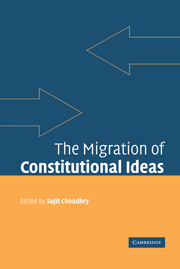Book contents
- Frontmatter
- Contents
- List of contributors
- Acknowledgements
- 1 Migration as a new metaphor in comparative constitutional law
- PART I The methodology of comparativism
- 2 On the blurred methodological matrix of comparative constitutional law
- 3 Some reflections on method in comparative constitutional law
- 4 The postwar paradigm and American exceptionalism
- PART II Convergence toward a liberal democratic model?
- PART III Comparative constitutional law, international law and transnational governance
- PART IV Comparative constitutional law in action – constitutionalism post 9/11
- Index
4 - The postwar paradigm and American exceptionalism
Published online by Cambridge University Press: 25 July 2009
- Frontmatter
- Contents
- List of contributors
- Acknowledgements
- 1 Migration as a new metaphor in comparative constitutional law
- PART I The methodology of comparativism
- 2 On the blurred methodological matrix of comparative constitutional law
- 3 Some reflections on method in comparative constitutional law
- 4 The postwar paradigm and American exceptionalism
- PART II Convergence toward a liberal democratic model?
- PART III Comparative constitutional law, international law and transnational governance
- PART IV Comparative constitutional law in action – constitutionalism post 9/11
- Index
Summary
It is easy to treat the written instrument as the paramount consideration, unmindful of the part played by the general law, notwithstanding that it is the source of the legal conceptions that govern us in determining the effect of the written instrument.
Introduction
The Constitution of the United States provided the inspiration for the rights-protecting constitutions of liberal democracies throughout the world. Yet the constitutional systems developed or newly established since the Second World War now differ from their US precursor. These systems have come to share a sophisticated legal paradigm that facilitates – indeed, perhaps necessitates – comparative engagement. The constitutional jurisprudence of the United States stands apart from this shared legal paradigm. Recently, prominent US judges and politicians have crossed swords on the issue of comparative reflection. This debate raises an important question: how should US scholars and judges define the relationship of their Constitution to the constitutional systems of liberal democracies that operate within the postwar constitutional paradigm?
To broach this subject one must consider the rancorous history of US constitutionalism over the last half century and beyond. Two competing constitutional conceptions vie for supremacy, each with its own view of fundamental principles, institutional role, and comparative engagement. A rights-based conception favours comparative engagement, regarding other constitutional systems as repositories of methodological direction, illuminating example, and theoretical reflection. The other, an indigenous, historically fixed conception, regards such engagement as unnecessary and perhaps even subversive.
The rights-based conception was dominant during the era of the Warren Court.
- Type
- Chapter
- Information
- The Migration of Constitutional Ideas , pp. 84 - 112Publisher: Cambridge University PressPrint publication year: 2007
- 8
- Cited by



